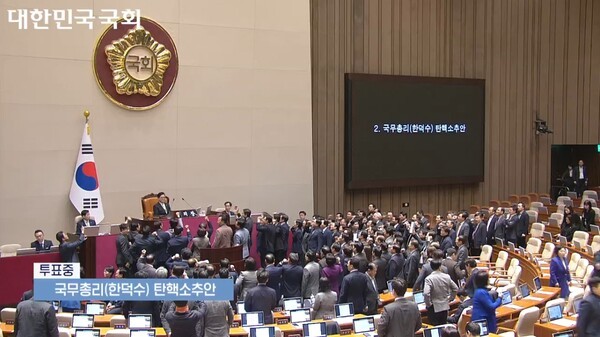The impeachment motion against the acting president and prime minister, unprecedented in constitutional history, was passed with 192 votes out of 192 registered.
National Assembly Speaker Woo Won-sik submitted the ‘Prime Minister Han Deok-soo impeachment bill’ at the plenary session held at the National Assembly on the 27th.
Before voting, Chairman Woo decided to apply the majority of registered members (151 votes), which is the standard for Prime Minister, as the quorum for voting on the impeachment bill against Acting President and Prime Minister Han Deok-soo.
Chairman Woo said, “I would like to inform you that this agenda is an impeachment motion against Prime Minister Han Deok-soo and will be decided with the approval of a majority of the registered members in accordance with Article 65, Paragraph 2 of the Constitution.”
He continued, “There are some differences of opinion regarding the quorum for voting on this agenda, but the National Assembly’s resolution on impeachment calls for removal from office, and the person subject to impeachment is the Prime Minister who exercises authority on behalf of the President in accordance with the Constitution.” He added, “The Constitution only imposes weight on the President.” “It stipulates a quorum for voting,” he said.
In addition, he said, “The Speaker has the authority to organize the proceedings of the National Assembly in accordance with Article 10 of the National Assembly Act,” and “To proceed with this agenda, we comprehensively reviewed the opinions of constitutional law academics and the National Assembly Research Service to determine the quorum for voting.”

Accordingly, the People Power Party members protested by looking at Chairman Ga Woo in front of the chairman’s chair and shouting slogans such as ‘Invalidate at source’ and ‘Chairman resign’. They then did not participate in the voting and left the plenary room as a group shortly after the voting was completed.
If an acting authority receives the ‘impeachment impeachment resolution’ from the National Assembly on this day, the acting authority’s duties will be suspended, and the next in line, Deputy Prime Minister and Minister of Strategy and Finance Choi Sang-mok, will serve as acting president and prime minister.
When the impeachment bill was passed on this day, Prime Minister Han said in a written statement, “I respect the decision of the National Assembly, and in order to avoid further confusion and uncertainty, I will suspend my duties in accordance with relevant laws and await a prompt and wise decision from the Constitutional Court.” did it
Regarding the withholding of the appointment of a Constitutional Court judge, which the Democratic Party of Korea cited as grounds for impeachment, Prime Minister Han said, “In our constitutional history, there has not been a single Constitutional Court judge appointed without agreement between the ruling and opposition parties,” and “In order to go beyond precedent and appoint a Constitutional Court judge, a representative of the people must be appointed.” “Agreement between the ruling and opposition parties is absolutely necessary,” he said.
Prime Minister Han continued, “The saying ‘the ruling and opposition parties will not be able to reach an agreement, so just appoint them’ means breaking the precedent of constitutional history and making it a fait accompli that discussion and agreement are no longer possible in our political culture, so we must accept it.” “I concluded that it was difficult,” he said.
Source: www.nextdaily.co.kr


